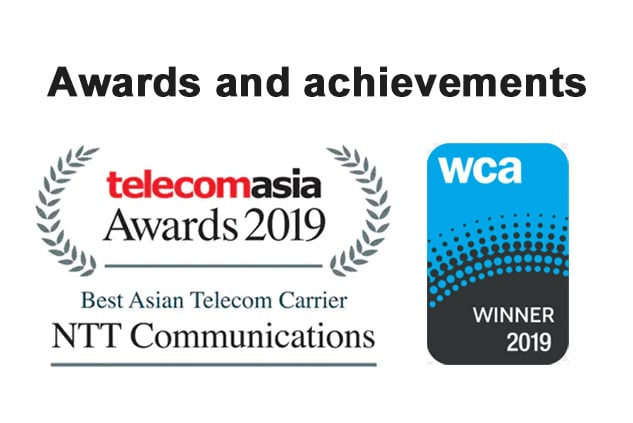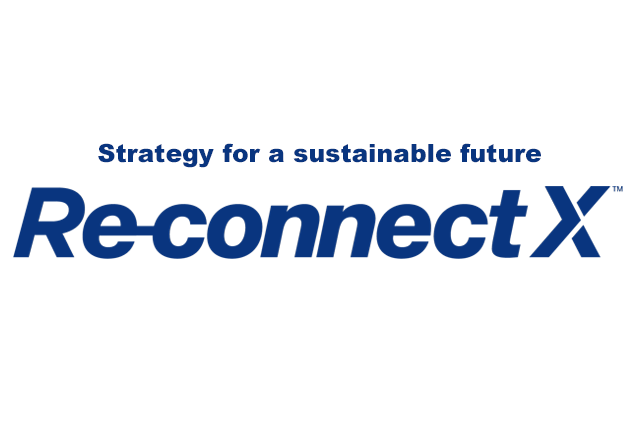Dialogue 2014
The NTT Communications Group is creating opportunities to conduct discussions with various stakeholders, with the view to engaging in a dialogue that facilitates closer communication.

NTT Communications promotes the cultivation of global human resources, supports career development and is stepping up its social contribution through its business activities.


Work as Local Professionals Helping to Cultivate Global Human Resources and Shape Careers
The NTT Communications Group conducts an overseas training program that is designed to cultivate global human resources. What do people who have taken advantage of this program gain? How does this experience help shape their careers? We address these questions in the following exchange between Mitsuo Ogawa, President of Craig Consulting, two young employees who have experienced work as overseas trainees, and Kiyoshi Mori, Executive Vice President and Chairperson of the CSR Committee.
- Ogawa:
- I understand that the NTT Communications Group is working to cultivate global human resources, with all the Group companies working together under the key message of “Global One Team.” The Group’s overseas training program is one key aspect of these efforts. Today, we have invited young employees who have taken part in this program to share their experiences.
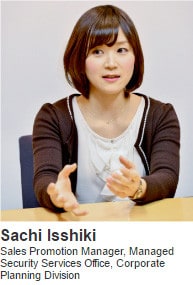
- Isshiki:
- I was in charge of preparing for the local service rollout of the new security services that NTT Singapore was introducing. It was important that the local sales team, engineers, operational contacts and other related departments first understood the value of the new service. To achieve this, I planned study sessions for salespeople and even had the opportunity to serve as a lecturer.
In Singapore, changing jobs is commonplace, so many participants adopted a third-party perspective toward our services. I was asked a number of hard questions, like how our service differed from competing services being offered there and what was the reason a Japanese company was rolling out security services locally. Sometimes it was difficult for me to answer questions like these to their satisfaction. To convince them, in addition to providing the information I received from developers, I had to look up information and give the questions a great deal of consideration myself.
- Ogawa:
- I see. My impression is that the ability to work overseas hinges on language skills, but there are other elements to communication that are difficult, too, aren’t there.
- Isshiki:
- Yes. My original reason for wanting to be an overseas trainee was that a number of global members belonged to the team I was working in. As we communicated in English on a daily basis, I developed a sense of urgency about my need to get better at the language. But while my actual overseas experience underscored the importance of language and communication skills, I also became keenly aware of the need to understand local people’s feelings and values. This is important when communicating with customers, as well as local personnel working within the company. I want to become better at correctly communicating the value of our services to people with different viewpoints and values.
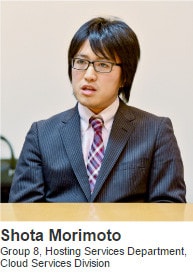
- Morimoto:
- I worked at NTT Europe, in charge of development of a cloud services controller section. Our team consisted of 40 people from the United Kingdom and only two Japanese expartriates, so all our communications were in English. Whereas in Japan people tend to hold meetings in order to make decisions, there people would just exchange views on an ad-hoc basis when necessary. So even more than having a technological background, it was important to be able to debate issues on the fly.
Managers also respected their local teams’ opinions. For example, a manager might ask “Will this be ready on time?” If I were to answer “Yes.”, then the decision was taken as having been made. I recall having a great deal of individual discretion.
- Ogawa:
- Interesting. Do you think this sort of hands-on approach will help your company to operate more effectively as its business grows more global?
- Morimoto:
- Well, since returning to Japan I have joined a team that is working on next-generation cloud development. Members of our team hail from Japan, India, the United States and the United Kingdom. When a Japanese engineer teams up with an engineer from overseas to develop something, the Japanese person tends to become flabbergasted and ask questions like “Don’t we have to follow this procedure?” I want to serve as a bridge between these two worldviews.
- Ogawa:
- You two seem to have gained some very solid experience. I would like to hear any thoughts or advice Mr. Mori might have to offer.
- Mori:
- I respect the fact that you have undergone various difficulties and gained experience at locations overseas. Right now, many others are undergoing these same trials overseas. It is extremely encouraging to think of the various skills they will bring back with them. As well as applying your experiences to your future work, I hope that you will provide good advice to the next group of people who wish to be overseas trainees.
Given that our company aims to grow further, it is essential for us to have employees with global sensibilities. I am in charge of CSR, and I believe that our core business of ICT is itself a type of CSR, or even CSV, which stands for “creating shared value.” This perspective involves contributing to society by working simultaneously to generate corporate profits and address societal issues. Please apply these global sensibilities that you have gained to help develop CSV throughout the world.
Back to top

Cultivating Global Human Resources in Japan and Overseas to Boost Our Presence in Global Marketets and Step up Our Social Conrtibution
The NTT Communications Group conducts an overseas training program that is designed to cultivate global human resources. What do people who have taken advantage of this program gain? How does this experience help shape their careers? We address these questions in the following exchange between Mitsuo Ogawa, President of Craig Consulting, two young employees who have experienced work as overseas trainees, and Kiyoshi Mori, Executive Vice President and Chairperson of the CSR Committee.
- Ogawa:
- In recent years, your group has worked aggressively to develop its business globally, and I understand that you are concentrating on the development of global human resources. Specifically, what sort of initiatives are underway?
- Mori:
- Given the rapid changes taking place in our business environment, in 2011 we introduced the Vision 2015 growth strategy and adopted the slogan “Global ICT Partner” as we set about transforming our business structure. At the same time, we resolved to cultivate personnel who were “globally seamless” in that they could be successful whether working in Japan or overseas.
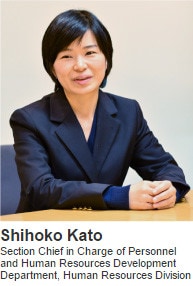
- Kato:
- Our basic policy on human resource development is to raise employees’ level of specialization through their work and cultivate professional human resources. By “global human resources,” we refer to people who have specialized expertise that they can deploy on a global stage. Our overseas training program is one way in which we cultivate these people. Since the launch of our new business plan in 2011, we have gradually increased the number of people taking part in this program. Nowadays, we send 70 to 80 people overseas every year. We also provide complementary training, but the main idea is for people to gain skills through on-the-job training.
- Ogawa:
- I see. So what sort of human resource development are you conducting from the “globally seamless” perspective you mentioned?
- Kato:
- I believe that human resource development is a necessary part of our efforts to promote globally seamless operations. As I mentioned earlier, the key is to have human resources who can deploy their own specialties overseas. Rather than something you can learn in a classroom, this capability has to be gained through personal experience. That is why I believe that having our people gain overseas experience at an early stage is an important part of human resource development.
- Ogawa:
- In addition to yourselves, other Japanese companies are also recognizing globalization as a key issue. Having spoken to a variety of companies, my feeling is that organizations need a sort of matrix, plotting “specialty” on the horizontal axis and “locality” on the vertical. That being said, even though companies are working to deploy their specialization globally, responding locally in different parts of the world is difficult. It seems to me that achieving this sort of “glocal” management will require companies to transfer authority to local personnel who are best equipped to respond to local needs.
- Mori:
- I agree. Local activities should be left in the hands of local employees, and it is important to transfer authority to the youngest people we can. I believe this approach has become more important as the operating arena has grown more global.
- Ogawa:
- The word “glocal” came up frequently in my earlier conversation with employees who had experience as overseas trainees, and the concept struck me as compelling. When I heard your company’s thoughts on dispatching people overseas, I was impressed by the concept of “encouraging people who have been sent overseas to make mistakes, experience discomfort and become embarrassed.” Can you explain that concept in more detail?
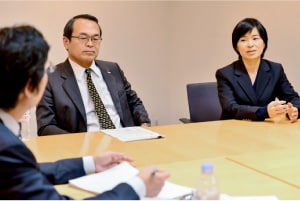
- Kato:
- The idea is that rather than encouraging an overseas trainee to spend their year in safety and comfort, we believe that they will learn more from making a variety of mistakes. To make the most of their experience, we encourage them to take on new challenges without being afraid to make mistakes.
- Ogawa:
- Organizational culture plays a major role in this, wouldn’t you say? I would think that recognizing successes and challenges rather than criticizing mistakes and fostering a climate of mutual praise is a key part of human resource development.
- Kato:
- In fact, we are working on that sort of initiative now. We have set employees’ professional human resource levels as milestones. Once each year, we honor employees who have achieved a certain level, and have them express their experiences on an internal site. We plan to keep up this sort of patient, steady effort, as it helps to foster a climate of professional development.
- Ogawa:
- I understand. The topic of CSV was raised earlier. This basically seems to me to describe a win–win relationship between a company and society. As it is employees who achieve CSV, surely it is essential that individual employees first have a firm understanding of societal issues. As an example, some overseas locations are experiencing water shortages but Japan has abundant water. People cannot truly grasp the idea of a water shortage unless they have been overseas and seen the situation with their own eyes. Understanding the problems that overseas locales face is the first step in making a contribution to them. In that sense, programs to cultivate global human resources are a way of putting CSV into actual practice.
- Mori:
- As you say, CSV is an approach that balances a company’s economic value and social value. Our group is studying the role of the ICT industry in CSV, and my tentative conclusion is that “ICT is in itself CSV.” The existence of telephones and the Internet reduces the need for people to move about, which saves energy, so making use of ICT contributes to society. Data centers are a recent example of the same phenomenon. The time has come for us to instill in our employees the awareness that we are involved in a business that makes a strong contribution to society. I hope today’s dialogue will help to raise interest in CSV.
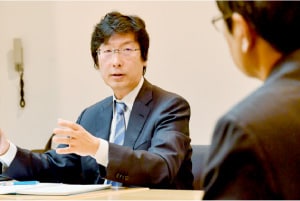
- Ogawa:
- Your company’s personnel exchanges are particularly “globally seamless” in the sense that you provide young overseas employees with learning opportunities in Japan, as well as sending young Japanese employees overseas. In conclusion, what message would you like to leave with the young employees—both from Japan and overseas—who will someday take up the reins of the NTT Communications Group?
- Kato:
- The trainee experience shouldn’t end when employees return. Rather, we hope they will continue to apply that experience. Our company is in a transition stage, and I would like to call upon our young employees to make the most of their specialties and global experience to help us make this change.
In our earlier discussion, I heard how overseas experience has a positive influence on the surrounding people. We also hope to benefit from this experience. In short, we hope that people will go overseas, take part in different types of work, learn new ways of doing things and understand local characteristics, then pass on this knowledge through their work. Through the repeated application of this cycle, I believe we can affect a sea change that will transform the company.
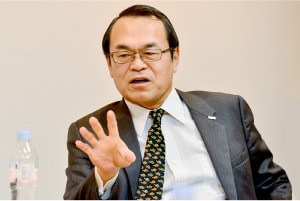
- Mori:
- I am reminded of Dr. Clark’s parting words to the Japanese students in Hokkaido: “Boys, be ambitious!” Adding slightly to this exhortation, I would encourage our employees to “Be ambitious and aggressive but also be appreciative and respectful.”
- Ogawa:
- In other words, they should have high ambitions and be motivated, but also conduct themselves with a spirit of mutual understanding and gratitude. Those are fine words. Thank you for your time today.
Back to top
 |
Mitsuo OgawaPresident, Craig Consulting After graduating from Waseda University, he served a stint at a major automotive-related manufacturer before going on to earn a Master in Business Administration (MBA) from the University of Pittsburgh. He then worked at Sanwa Research Institute and PwC Consulting. In 2004 he struck out on his own and established Craig Consulting Co., Ltd. In addition to CSR consulting, he has expanded his business scope into M&A, business strategy formulation, and human resources development. Through a partnership with Nikkei, Inc., he has provided support for the Nikkei CSR Project since its inception in 2004.He is also a visiting professor on organizational theory in the Weekend MBA Program at the Nagoya University of Commerce & Business. |
|---|
Back to top
 EN
EN
